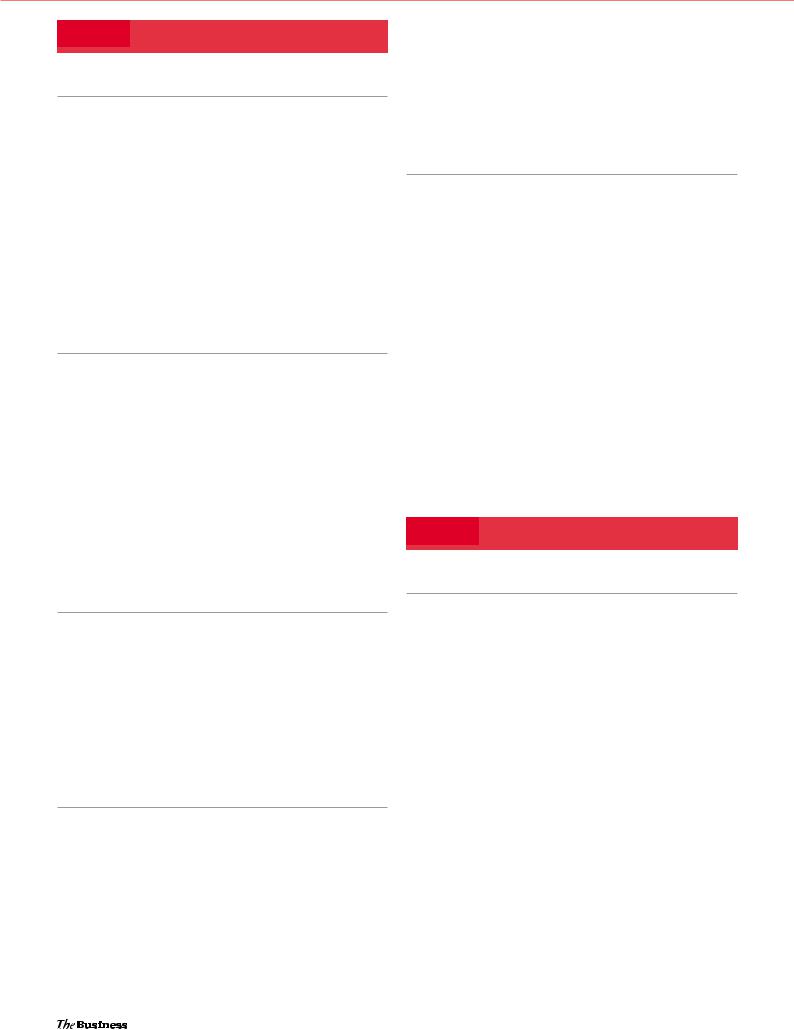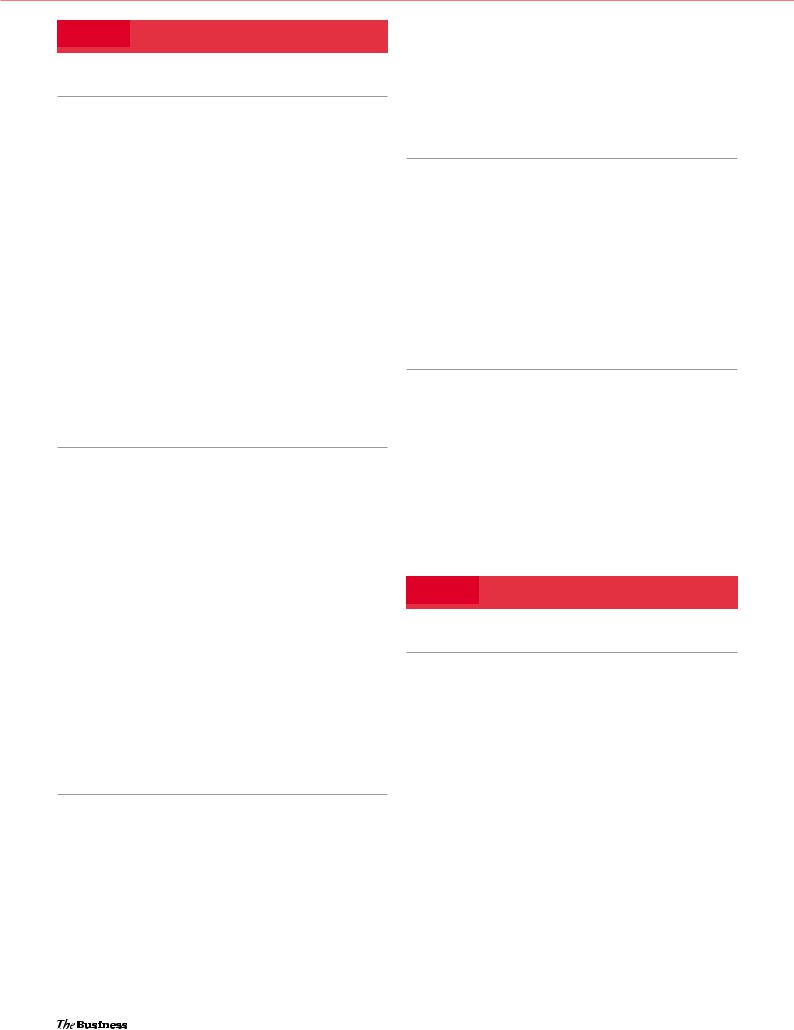
busint_trd_glossary
.pdf
The Business 2.0
Glossary
The definitions for the words in this glossary are from the Macmillan Dictionary. The red words are high-frequency words, that is to say that they are among the 7,500 which native speakers use for 90% of what they speak or write. See http://www.macmillandictionary.com for more information.
Unit 1 Corporate culture
1.1 About business
Work culture and placements
assignment /əˈsaɪnmənt/ noun [count or uncount] task given as part of your studies or your job: His first assignment as a reporter was to cover the local election.
autonomy /ɔːˈtɒnəmi/ noun [uncount] the power to make your own decisions: New regulations have severely restricted the autonomy of doctors.
beating /ˈbiːtɪŋ/ noun [count] the act of hitting someone hard a number of times as a punishment: The man had been given a severe beating.
dress code /dres kəʊd/ noun [count] a set of rules about what you should wear in a particular place or at a particular event: The dress code in our office is very formal: everybody wears a suit.
etiquette /ˈetɪket/ noun [uncount] a set of rules for behaving correctly in a particular situation: Office etiquette demands that you don’t read other people’s messages.
initiative /ɪˈnɪʃətɪv/ noun [uncount] the ability to think of ideas and take decisions independently.
Take the initiative: to take the first step or be the first to take action: She would have to take the initiative in order to improve their relationship.
intern /ˈɪntɜː(r)n/ noun [count] a student or recently qualified person who works in a job in order to get experience: Most employers prefer interns who already have some work experience.
pick up /ˌpɪk ˈʌp/ phrasal verb [transitive] to learn information or a new skill without trying or without meaning to.
1.2 Vocabulary
Work organization and responsibility
on a day-to-day basis /ɒn ə deɪ tə deɪ ˈbeɪsɪs/ phrase used for saying how often something happens. On a daily/ monthly/annual, etc. basis: Safety equipment was checked on a daily basis.
organigram /ɔː(r)ˈɡænəɡræm/ noun [count] a drawing or plan that gives the names and job titles of all the staff in an organization or department.
predecessor /ˈpriːdɪˌsesə(r)/ noun [count] the person
who had the job before: Alexander seems to have learned nothing from the faults of his predecessors.
take over /teɪk ˈəʊvə(r)/ phrasal verb [transitive] to take control of something: IBM is taking over a much smaller company.
1.5 Writing
A placement report
appendix /əˈpendɪks/ noun [count] a section giving extra details at the end of a book or document: Technical specifications are included in the appendix to Chapter 9.
gearbox /ˈɡɪə(r)ˌbɒks/ noun [count] a metal box that contains the parts of a vehicle or a machine that change engine power into movement.
mailshot /ˈmeɪlˌʃɒt/ noun [count] a letter or advertisement sent to many people at the same time.
rapport /ræˈpɔː(r)/ noun [singular or uncount] good relationship and understanding between people.
take the mickey /teɪk ðə ˈmɪki/ phrase British Informal to laugh at somebody, usually in a friendly way.
waste /weɪst/ noun [count or uncount] useless materials that are left or thrown away: A bill was introduced to clean up toxic waste from local factories.
1.6 Case study Counselling
body language /ˈbɒdi ˌlӕŋɡwɪʤ/ noun [uncount] the movements or positions of your body that show other people what you are thinking or feeling: Their body language betrayed the tension between them.
bounce back /ˌbaʊns ˈbӕk/ phrasal verb [intransitive] to become healthy, happy or successful again after something bad has happened to you.
echo /ˈekəʊ/ verb [transitive] to express someone else’s ideas or to say the same words that someone else has said:
Blake echoed the views of many employees.
headache /ˈhedeɪk/ noun [count] a pain in your head: I’ve got a splitting headache (= an extremely bad headache).
open question /ˌəʊpən ˈkwestʃ(ə)n/ noun [count] a question with a wh- question word, as opposed to a closed question which has a yes/no answer.
outlook /ˈaʊtˌlʊk/ noun [singular] your general attitude to things: share an outlook: They shared the same kind of outlook on life.
paraphrase /ˈpӕrəˌfreɪz/ verb [transitive] to express what someone else has said using different words: It is
particularly important when paraphrasing to be sure that you do not distort the meaning of the original statement.
perspective /pə(r)ˈspektɪv/ noun 1 [count] a way of thinking about something: 2 [uncount] a sensible way of judging the importance of something in comparison with other things: keep something in perspective: It’s
important to keep things in perspective and not dwell on one incident.
|
|
1 |
2.0 B1+ Intermediate Teacher’s Resource Disc © Macmillan Publishers Limited 2013 |
Glossary |

Glossary
Unit 2 Customer support
2.1 About business Call centres
bus /bʌs/ verb [transitive] to take someone somewhere by bus.
copycat /ˈkɒpiˌkӕt/ adjective similar to something else and considered to be a copy of it: copycat crimes.
tax break /tӕks breɪk/ noun [count] a reduction in the tax that you must pay: A tax break for college.
tax holiday /ˌtӕks ˈhɒlɪdeɪ/ noun [count] a temporary period, during which time the government removes certain taxes (usually sales tax) on certain items, in order to encourage the consumption or purchase of these items.
twentysomething /ˈtwentiˌsʌmθɪŋ/ noun [count] refers to the age of someone who is between twenty and twentynine.
2.2 Vocabulary
Customer service and telephoning
clip /klɪp/ noun [count] a small object that holds something in position: hair clip.
earth /ɜː(r)θ/ verb [transitive] British to connect a piece of electrical equipment to the ground so that it is safe: Make sure the machine is earthed properly.
retain /rɪˈteɪn/ verb [transitive] to keep someone or something.
side-panel /ˈsaɪd ˌpæn(ə)l/ noun [count] a flat part of a box or other object that can be removed.
slot /slɒt/ noun [count] a long narrow hole that you can fit something into.
upset /ʌpˈset/ adjective very sad, worried or angry about something: Why are you so upset?
2.4 Speaking
Dealing with problems by telephone
Come again? /kʌm əˈɡen/ Informal used for asking someone to repeat what they have just said.
crash /kræʃ/ verb [intransitive or transitive] Computing if a computer or computer program crashes, it suddenly stops working.
freeze /friːz/ verb [intransitive or transitive] Computing if a computer screen freezes or is frozen you cannot move anything on it because there is something wrong with the computer.
2.5 Writing
Formal and informal correspondence
accounts payable /əˌkaʊnts ˈpeɪəb(ə)l/ noun [plural] Mainly American a record of how much money a company owes other people or companies for goods and services.
ASAP /ˌeɪ es eɪ ˈpiː/ abbreviation as soon as possible. crack /kræk/ verb [transitive] to damage something so that
a line appears on its surface, but it does not break into pieces: I dropped a plate and cracked it.
duplicate /ˈdjuːplɪkeɪt/ adjective made as an exact copy of something else.
inconsistency /ˌɪnkənˈsɪstənsi/ noun [count] something that does not match something else.
patch /pætʃ/ noun [count] a piece of software that you add to a computer program to improve it or remove a fault.
Trojan (horse) /ˈtrəʊdʒ(ə)n hɔː(r)s/, noun [count]
Computing a program that seems useful but is designed to cause damage, for example by destroying information.
write-off /raɪt ɒf/ noun [count] a vehicle or machine that is so badly damaged that it cannot be repaired.
2.6 Case study Cybertartan Software
come up with /ˌkʌm ˈʌp wɪð/ phrasal verb [transitive] to think of something such as an idea or a plan.
from the horse’s mouth /frəm ðə ˈhɔː(r)sˌɪz maʊθ/
Informal information from the horse’s mouth comes from someone who is directly involved.
obsolescence /ˌɒbsəˈles(ə)ns/ noun [uncount] the state of something which is no longer used: planned obsolescence the practice of making products that will not last long, so that people will need to buy new ones.
shift /ʃɪft/ noun [count] a period of work in a factory or business where some people work during the day and some work at night: a three-shift system.
staff turnover /stɑːf ˈtɜː(r)nəʊvə(r)/ noun [count or uncount] the rate at which people leave jobs and new people arrive: a high turnover of staff/personnel
swap /swɒp/ verb [intransitive or transitive] to give something to someone in exchange for something else: Do you want to swap seats?
triple /ˈtrɪp(ə)l/ verb [transitive] to increase something so that it is three times bigger than before: He helped triple the value of the company.
Unit 3 Products and packaging
3.1 About business Packaging
focus group /ˈfəʊkəs ˌɡruːp/ noun [count] a small group of people who are interviewed together and give their opinions to help a company make decisions.
frustration /frʌˈstreɪʃ(ə)n/ noun [count or uncount] the feeling of being frustrated.
interface with /ˌɪntə(r)ˈfeɪs/ verb [intransitive] interact and communicate with each other.
provocation /ˌprɒvəˈkeɪʃ(ə)n/ noun [count or uncount] the act of doing or saying something deliberately in order to make somebody angry or upset. She bursts into tears at the slightest provocation.
rage /reɪdʒ/ noun [count or uncount] a very strong feeling of anger: Mainly journalism angry violent behaviour in a public situation: It is clear that air rage is now on the increase.
resistant /rɪˈzɪst(ə)nt/ adjective able to resist something: a disease that is resistant to antibiotics.
trigger /ˈtrɪɡə(r)/ verb [transitive] to make something happen: to trigger an alarm.
wrap /ræp/ verb [transitive] to cover something by putting something such as paper or plastic around it: I wrapped my present for my sister’s birthday.
|
|
2 |
2.0 B1+ Intermediate Teacher’s Resource Disc © Macmillan Publishers Limited 2013 |
Glossary |

Glossary
3.2 Vocabulary Specifications and features
attention-grabbing /əˈtenʃ(ə)n ˌɡræbɪŋ/ adjective
an attention-grabbing remark or activity is one that is intended to make people notice it.
bird’s-eye view /ˌbɜːdz aɪ ˈvjuː/ noun [singular] a good view of something from a high position.
blueprint /ˈbluːˌprɪnt/ noun [count] a drawing that shows how to build something.
chart /tʃɑː(r)t/ noun [count] a map used for navigation in boats or planes.
fool-proof /ˈfuːlˌpruːf/ adjective very well designed and easy to use so that it cannot fail and you cannot use it wrongly.
This recipe is fool-proof: it works every time.
mockup /ˈmɒkʌp/ noun [count] a model of a future product that is the same size as the real thing.
overlay /ˈəʊvə(r)ˌleɪ/ noun [count] a set of extra information that is added to a picture by a computer.
retardant /rɪˈtɑː(r)d(ə)nt/ adjective slowing down a process.
This door is fire retardant.
tamper with /ˈtæmpə(r) ˌwɪð/ phrasal verb [transitive] to touch something and change it in a way that will damage it.
3.3 Grammar
Relative clauses, articles and noun combinations
bump /bʌmp/ verb [intransitive or transitive] to hit against something solid: The car bumped into a tree.
drop calls /ˈdrɒp kɔːlz/ phrase to fail to connect incoming calls.
empowerment /ɪmˈpaʊə(r)mənt/ noun [uncount] giving control or power over something.
flip cover /ˈflɪp ˌkʌvə/ noun [count] part of a mobile phone which folds over the keypad.
get rid of /ɡet ˈrɪd əv/ phrasal verb [transitive] to throw away, give away or sell a possession that you no longer want: I have to get rid of my old computer.
no frills /ˈnəʊ frɪlz/ expression used for something which is good enough but has no unnecessary extra features:
A simple meal with no frills.
rating /ˈreɪtɪŋ/ noun [count] a measurement of how good or popular someone or something is: The guide gives restaurants a rating out of ten.
workhorse /ˈwɜː(r)kˌhɔː(r)s/ noun [count] a very useful piece of equipment that you use a lot: My old car was a great workhorse.
3.4 Speaking Presentations – structure
hook /hʊk/ noun [count] a curved piece of metal for hanging things on; a method for getting people interested and attracted to something: Hang your coat on the hook.
lecture /ˈlekʧə(r)/ noun [count] a talk to a group of people about a particular subject, especially at a college or university: This lecture about the Dark Ages was really fascinating.
overwhelmingly /ˌəʊvə(r)ˈwelmɪŋli/ adverb very strongly:
They voted overwhelmingly against the proposal.
ping /pɪŋ/ verb [transitive] Computing to send an electronic signal requesting an answer from a device: I’ll ping it to you later.
tracking /ˈtrækɪŋ/ noun [uncount] the act of following or looking for a person, animal or thing.
wrap up /ˌræp ˈʌp/ phrasal verb [intransitive or transitive]
Informal to finish something: That just about wraps it up for today.
3.5 Writing
A product description
alloy /ˈælɔɪ/ noun [count or uncount] a metal that is made from combining two or more metals.
benefit /ˈbenɪfɪt/ noun [count or uncount] an advantage you get from a product or situation.
feature /ˈfiːʧə(r)/ noun [count] an important part or aspect of a product.
intuitive /ɪnˈtjuːtɪv/ adjective an intuitive system is easy to use because the process of operating it is very natural or obvious.
plug-in /ˈplʌɡɪn/ noun [count] Computing a software addition which allows an application to perform additional functions.
quibble /ˈkwɪb(ə)l/ noun [count] a complaint or criticism about something that is not important: no quibble guarantee a promise to refund the customer without questioning their reasons for dissatisfaction.
stand out /ˌstænd ˈaʊt/ phrasal verb [intransitive] to be easy to see because of being different.
3.6 Case study Big Jack’s Pizza
BOGOF /ˈbɒɡɒf/ abbreviation buy one, get one free. chequered /ˈʧekə(r)d/ adjective a chequered pattern or
design consists of squares in two or more different colours. dine-in /ˌdaɪn ˈɪn/ adjective used to describe meals taken in a
restaurant: dine-in curry
franchisee /ˌfrænʧaɪˈziː/ noun [count] a person or company that has the franchise to sell a particular type of goods or services.
fusion cuisine /ˈfjuːʒn kwɪˈziːn/ noun [uncount] a particular style of cooking food combining Chinese and Western recipes.
gourmet /ˈɡʊə(r)meɪ/ noun [count] someone who knows a lot about good food and wine.
slide /slaɪd/ verb [intransitive] to move across a smooth surface.
strengthen /ˈstreŋθ(ə)n/ verb [transitive] to make something stronger.
threat /θret/ noun [count or uncount] something that could cause harm.
USP /juː es ˈpiː/ noun [count] Business unique selling point/ proposition: the thing that makes a product or service different from others.
|
|
3 |
2.0 B1+ Intermediate Teacher’s Resource Disc © Macmillan Publishers Limited 2013 |
Glossary |

Glossary
Unit 4 Careers
4.1 About business Career choices
earth-shattering /ˈɜː(r)θ ʃæt(ə)rɪŋ/ adjective extremely surprising and important.
inertia /ɪˈnɜː(r)ʃə/ noun [uncount] a situation in which something does not change: a feeling of not wanting to change things.
jump in at the deep end /ˌdʒʌmp ˈɪn ˌæt ðə ˈdiːp ˌend/ phrasal verb [intransitive] to become involved in a difficult situation with little preparation.
pick someone’s brains /ˌpɪk ˈsʌmwʌnz ˌbreɪnz/ expression
Informal to ask someone questions to get advice or information: I wanted to pick your brains about this idea I’ve had.
posse /ˈpɒsi/ noun [count] Informal a group of friends. start the ball rolling /ˌstɑː(r)t ðe ˈbɔːl ˌrəʊlɪŋ/ expression to make something start happening.
stay put /ˌsteɪ ˈpʊt/ verb [intransitive] to remain in one place or position.
treadmill /ˈtredˌmɪl/ noun [count] a situation that is very tiring or boring because you do the same things continuously.
4.2 Vocabulary
Careers, personal skills and qualities
controversial /ˌkɒntrəˈvɜː(r)ʃ(ə)l/ adjective a controversial subject, opinion or decision is one that people disagree about or do not approve of.
flag /flæɡ/ verb [transitive] to mark something so that you will be able to find it again.
headhunter /ˈhedˌhʌntə(r)/ noun [count] a person or company who searches for good staff and tries to persuade them to leave their jobs and go to work for another company.
liaise with /liˈeɪz/ verb [intransitive] if one person liaises with another or people liaise, they talk to each other and tell each other what they are doing, so that they can work together effectively.
multitasking /ˌmʌltiˈtɑːskɪŋ/ noun [uncount] doing several things at the same time.
on the spot /ˌɒn ðə ˈspɒt/ expression immediately. unconventional /ˌʌnkənˈvenʃ(ə)nəl/ adjective different from what most people consider to be usual or normal. wannabe /ˈwɒnəbi/ noun [count] Informal someone who
wants to be famous or successful.
4.3 Grammar Present tenses
assault course /əˈsɔːlt ˌkɔː(r)s/ noun [count] an exercise involving running, climbing and jumping, used in military training.
hand /hænd/ verb [transitive] to give something to someone with your hand; you have to hand it to someone expression Spoken used for saying that you admire someone for something they have done.
knock over /ˌnɒk ˈəʊvə(r)/ verb [transitive] to hit something so that it falls: The car knocked him over.
relevant /ˈreləv(ə)nt/ adjective directly connected to what is being discussed or considered.
undergraduate /ˌʌndə(r)ˈɡrædʒʊət/ noun [count] a student who is studying for a first degree at a college or university.
You’re kidding /ˌjɔː(r) ˈkɪdɪŋ/ expression mainly spoken used for saying that you do not believe what someone is saying.
4.4 Speaking Job interviews
achievement /əˈtʃiːvmənt/ noun [count] a particular thing that you have succeeded in doing after a lot of effort.
cope with /ˈkəʊp ˌwɪð/ verb [intransitive] to deal successfully with a difficult situation or job.
rapport /ræˈpɔː(r)/ noun [singular/uncount] a relationship in which people like, understand, and respect each other:
Having good rapport with your clients is essential. regardless of /rɪˈɡɑː(r)dləs əv/ phrase without being affected
by.
strength /streŋθ/ noun [count] something that someone does well: Ron’s main strength is his ability to motivate players.
weakness /ˈwiːknəs/ noun [count] a fault or problem that makes someone less effective or attractive.
4.6 Case study
Gap years and career breaks
eco- /iːkəʊ/ prefix relating to the environment: used with some nouns and adjectives.
find your feet /ˌfaɪnd jə(r) ˈfiːt/ expression to start to feel confident and familiar with something.
step back /ˌstep ˈbæk/ phrasal verb [intransitive] to stop for a moment in order to consider something objectively.
tangible /ˈtændʒəb(ə)l/ adjective important and noticeable: tangible evidence
underprivileged /ˌʌndə(r)ˈprɪvəlɪdʒd/ adjective not
having as many advantages or opportunities as most other people.
Unit 5 Making deals
5.1 About business Retailing
bricks-and-mortar /ˌbrɪks ænd ˈmɔː(r)tə(r)/ expression a building, when you are thinking of it in connection with how much it cost to build or how much it is worth: They put their money into bricks and mortar.
claw /klɔː/ noun [count] the sharp curved part at the end of some animal’s toes, for example a cat.
hit /hɪt/ noun [count] a piece of information that a computer program finds for you: I searched for the name ‘Mundy’ and got over 50 hits.
|
|
4 |
2.0 B1+ Intermediate Teacher’s Resource Disc © Macmillan Publishers Limited 2013 |
Glossary |

Glossary
5.4 Speaking Negotiations – bargaining
down time /ˈdaʊn ˌtaɪm/ noun [count or uncount] period during which equipment or a machine is not functional or cannot work.
lead time /ˈliːd ˌtaɪm/ noun [count or uncount] the time between starting and completing a production process.
package /ˈpækɪdʒ/ noun [count] a set of products or services that are sold together as one unit.
reluctant /rɪˈlʌktənt/ adjective not willing to do something. tentative /ˈtentətɪv/ adjective not definite or certain.
5.5 Writing A proposal
cash flow /ˈkæʃ ˌfləʊ/ noun [uncount] the rate at which a business takes in money through sales and pays it out for the things it needs to continue operating.
contingency plan /kənˈtɪndʒ(ə)nsi ˌplæn/ noun [uncount] a plan that helps you to prepare for possible bad events.
mail order /ˌmeɪl ˈɔː(r)də(r)/ noun [uncount] a way of buying goods in which you order them by post or by telephone and they are posted to you.
merchant account /ˈmɜː(r)tʃ(ə)nt əˌkaʊnt/ noun [count] a special account for performing e-business transactions. set-up fee /ˈset ʌp fiː/ noun the price you have to pay to
have a piece of equipment installed.
Unit 6 Company and community
6.1 About business
Corporate social responsibility
altruism /ˈæltruˌɪz(ə)m/ noun [uncount] a way of thinking and behaving that shows you care about other people and their interests more than you care about yourself.
biodegradable /ˌbaɪəʊdɪˈɡreɪdəb(ə)l/ adjective biodegradable substances can be broken into very small parts by bacteria so that they are not harmful to the environment.
credo /ˈkriːdəʊ/ noun [count] a statement of your beliefs. hybrid /ˈhaɪbrɪd/ noun [count] a mixture of different things
or styles.
sustainable /səˈsteɪnəb(ə)l/ adjective capable of continuing for a long time at the same level.
virtuous circle /ˈvɜː(r)tʃʊəs ˈsɜː(r)k(ə)l/ noun [singular] a process in which a good action or event produces a good result that also causes the process to continue so that more good results happen.
6.2 Vocabulary
Meetings, ethical behaviour and social performance
damage limitation /ˈdæmɪdʒ ˌlɪmɪˈteɪʃ(ə)n/ noun [uncount] the process of trying to limit the amount of damage that is caused by something.
extravagant /ɪkˈstrævəɡənt/ adjective extreme, excessive or unreasonable.
misleading /mɪsˈliːdɪŋ/ adjective giving the wrong idea or impression and making you believe something that is not true.
settlement /ˈset(ə)lmənt/ noun [count] an official agreement that ends an argument between two people or groups.
6.3 Grammar
The passive and reported speech
leakage /ˈliːkɪdʒ/ noun [uncount] an amount of liquid or gas escaping through a hole in something.
protracted /prəˈtræktɪd/ adjective Formal continuing for a long time, especially longer than is normal or necessary.
stakeholder /ˈsteɪkˌhəʊldə(r)/ noun [count] a person or company that is involved in a particular organization, project, system, etc., especially because they have invested money in it.
6.4 Speaking Meetings – teamwork
civil servant /ˌsɪv(ə)l ˈsɜː(r)v(ə)nt/ noun [count] someone who works for a government department.
disabled /dɪsˈeɪb(ə)ld/ adjective someone who is disabled is unable to use part of their body or brain properly because of injury or disease.
ethnic minority /ˌeθnɪk maɪˈnɒreti/ noun [count] a group of people who have a different culture and different traditions to most people living in a place.
misconduct /mɪsˈkɒndʌkt/ noun [uncountable] unacceptable behaviour.
6.5 Writing
Reports and minutes
derive /dɪˈraɪv/ verb [transitive] to get a feeling from something e.g. pleasure, satisfaction: derive something from something: They derive great enjoyment from these simple games.
greenfield site /ˈɡriːnfiːld ˌsaɪt/ noun [count] a piece of land that has never been built on before.
paternalism /pəˈtɜː(r)nəˌlɪz(ə)m/ noun [uncount] governing like a father, by looking after people but also taking away their freedom and responsibilities.
positive discrimination /ˌpɒzətɪv dɪˌskrɪmɪˈneɪʃ(ə)n/ noun [uncount] the practice of giving special benefits to people from a group that was treated in an unfair way in the past.
6.6 Case study Phoenix
hazardous /ˈhæzə(r)dəs/ adjective dangerous, especially to people’s health or safety: These chemicals are hazardous to human health.
resident /ˈrezɪd(ə)nt/ noun [count] a person who lives in a particular place.
resistance /rɪˈzɪst(ə)ns/ noun [uncount] dislike of or opposition to a plan, an idea, etc.
|
|
5 |
2.0 B1+ Intermediate Teacher’s Resource Disc © Macmillan Publishers Limited 2013 |
Glossary |

Glossary
Unit 7 Mergers and acquisitions
7.1 About business
Risks and opportunities in M&A
due diligence /ˌdjuː ˈdɪlɪdʒ(ə)ns/ noun [uncount] investigation of a company’s activities and finances before investment or acquisition.
gene /dʒiːn/ noun [count] information in cells that determines a person’s characteristics: He believes that shyness is in the genes.
homogenize /həˈmɒdʒənaɪz/ verb [transitive] to make things the same, often so that the result is boring.
open enrolment /ˌəʊpən ɪnˈrəʊlmənt/ noun [count] a university class which anybody can join.
prestigious /preˈstɪdʒəs/ adverb respected and admired as very important or of a very high quality.
susceptible /səˈseptəb(ə)l/ adjective easily influenced or affected.
takeover bid /ˈteɪkˌəʊvə(r) ˌbɪd/ noun [count or uncount] an offer to buy the shares in a company and take control of it: Shareholders have accepted a takeover bid.
turmoil /ˈtɜː(r)mɔɪl/ noun [uncount] a state of excitement or uncontrolled activity.
7.2 Vocabulary Business performance
be in the black /biː ɪn ðə ˈblæk/ expression to have money in your bank account or more money than you owe: We’ve been in the black for over a year now.
bid /bɪd/ noun [count] an offer to give a particular amount of money for something, for example at an auction: We received a bid of £5,000 for the table.
filter through /fɪltə(r) ˈθruː/ verb [intransitive] if news or infomation filters through to people, they receive it
gradually or after a period of time: News of the decision filtered through to reporters.
flotation /fləʊˈteɪʃ(ə)n/ noun [count or uncount] Business the sale of shares in a company for the first time.
FTSE 100, the /ˌfʊtsi wʌn ˈhʌndrəd/ noun [uncount] the Financial Times Stock Exchange index; an average of the prices of shares from the top 100 companies on the London stock exchange.
rumour /ˈruːmə(r)/ noun [count or uncount] unofficial information that may or may not be true: He’d heard rumours about some big financial deal.
7.4 Speaking Presentations – visuals
crucial /ˈkruːʃ(ə)l/ adjective extremely important; crucial to: Listening to customers’ needs is crucial to designing good products.
deteriorate /dɪˈtɪəriəreɪt/ verb [intransitive] to become worse: The economic situation is deteriorating.
disposable income /dɪˈspəʊzəb(ə)l ˈnkʌm/ noun [uncount] money that you have left to spend after you have paid your bills.
highlight /ˈhaɪˌlaɪt/ verb [transitive] to emphasize or underline part of something: The presenter highlighted the need for a quick decision.
overload /ˌəʊvə(r)ˈləʊd/ verb [transitive] to put too much of something on something; to present people with too much information for them to understand easily.
7.5 Writing Presentation slides
bullet points /ˈbʊlɪt pɔɪnts/ noun [count] a circle printed before each item on a list.
distracting /dɪˈstræktɪŋ/ adjective preventing you from concentrating on something: This noise outside the classroom is very distracting.
font /fɒnt/ noun [count] Technical the style of letters and numbers used in a document.
vague /veɪɡ/ adjective not clearly explained or very detailed: Witnesses gave only a vague description of the driver.
7.6 Case study Calisto
charismatic /ˌkærɪzˈmætɪk/ adjective a charismatic person has a strong personality that makes other people like them and be attracted to them.
meteoric /ˌmiːtiˈɒrɪk/ adjective becoming very successful very quickly.
ruthless /ˈruːθləs/ adjective willing to make other people suffer so that you can achieve your aims.
slick /slɪk/ adjective done in a very impressive way that seems to need very little effort.
trumpet /ˈtrʌmpɪt/ verb [transitive] to announce something publicly in a way that is intended to make it seem very important.
Unit 8 International trade
8.1 About business Export sales and payment
chase /tʃeɪs/ verb [transitive] to try hard to get something you want: Many companies are still chasing debts that are more than five years old.
creditworthiness /ˈkredɪtˌwɜː(r)ðinəs/ noun [uncount] ability to repay debts.
level playing field /ˌlev(ə)l ˈpleɪŋ fiːld/ noun [singular] a situation that is fair for everybody involved.
take on board /ˌteɪk ɒn ˈbɔː(r)d/ expression to consider an idea, to accept criticism and learn from past mistakes.
think outside the box /ˈθɪŋk aʊtˌsaɪd ðə ˈbɒks/ expression to find new and unusual ways of doing things, especially solving problems.
without a trace /wɪðˈaʊt ə ˈtreɪs/ expression no sign that someone has been present; disappear without trace: She was seen last week, then disappeared without trace.
wizard /ˈwɪzə(r)d/ noun [count] someone who is very good at something.
|
|
6 |
2.0 B1+ Intermediate Teacher’s Resource Disc © Macmillan Publishers Limited 2013 |
Glossary |

Glossary
8.2 Vocabulary
International deals and payments
file a claim /ˌfaɪl ə ˈkleɪm/ verb [transitive] to present a claim so that it can be officially recorded and dealt with.
forwarder /ˈfɔː(r)wə(r)də(r)/ noun [count] firm specializing in arranging storage and shipping of merchandise on behalf of its shippers.
frequent-flyer scheme /ˌfriːkwentˈflaɪə(r) ˌskiːm/ noun
[count] a system to encourage people to travel with the same airline by giving them reductions or gifts.
get behind with /ˌɡet bɪˈhaɪnd ˌwɪð/ phrasal verb
[intransitive] if you get behind with work or payments, you have not done as much work or made as many payments as you should have: She’d been ill so often that she was getting behind with her schoolwork.
8.3 Grammar
Prepositions
drop off /ˌdrɒp ˈɒf/ phrasal verb [transitive] to take something to a place and not stay there long: Is it OK if I drop the documents off later?
jet-lagged /ˈdʒetˌlæɡd/ adjective feeling tired and sometimes confused after a long flight.
pitch /pɪtʃ/ noun [count] an oral proposal designed to persuade someone to buy your product or support you.
8.4 Speaking Negotiations – diplomacy
consensus /kənˈsensəs/ noun [uncount] an opinion that all members of a group agree with.
implication /ˌɪmplɪˈkeɪʃ(ə)n/ noun [count usually plural] a possible effect or result: We need to consider the financial implications.
quit /kwɪt/ verb [intransitive or transitive] to leave a job or project: She quit after only six months in the job.
8.5 Writing
Requests and reminders
disregard /ˌdɪsrɪˈɡɑː(r)d/ verb [transitive] to pay no attention to something.
extend /ɪkˈstend/ verb [transitive] Formal to agree to lend someone money or give them credit.
factoring /ˈfæktərɪŋ/ noun [uncount] selling a company’s receivable invoices in order to obtain funds more quickly.
outstanding /ɑʊtˈstændɪŋ/ adjective an amount of money that is outstanding has not yet been paid.
overdue /ˌəʊvə(r)ˈdjuː/ adjective if a payment is overdue, it should have been paid before now.
oversight /ˈəʊvə(r)ˌsaɪt/ noun [count] something you do not think of which causes problems later.
settle /ˈset(ə)l/ verb [transitive] to pay all the money you owe someone: He has 30 days to settle his bill.
8.6 Case study
Jeddah Royal Beach Resort
armoury /ˈɑː(r)məri/ noun [usually singular] a set of skills, equipment or powers that is available for someone if they need it.
loyalty /ˈlɔɪəlti/ noun [uncount] continued use of the products or services of a particular business: A high level of brand loyalty.
uncollectible /ʌnkəˈlektəb(ə)l/ noun [count] a bad debt which cannot be recovered.
vulgar /ˈvʌlɡə(r)/ adjective someone who is rude, unpleasant, and offensive.
word of mouth /ˌwɜː(r)d əv ˈmaʊθ/ expression information communicated by people speaking informally to each other.
|
|
7 |
2.0 B1+ Intermediate Teacher’s Resource Disc © Macmillan Publishers Limited 2013 |
Glossary |
